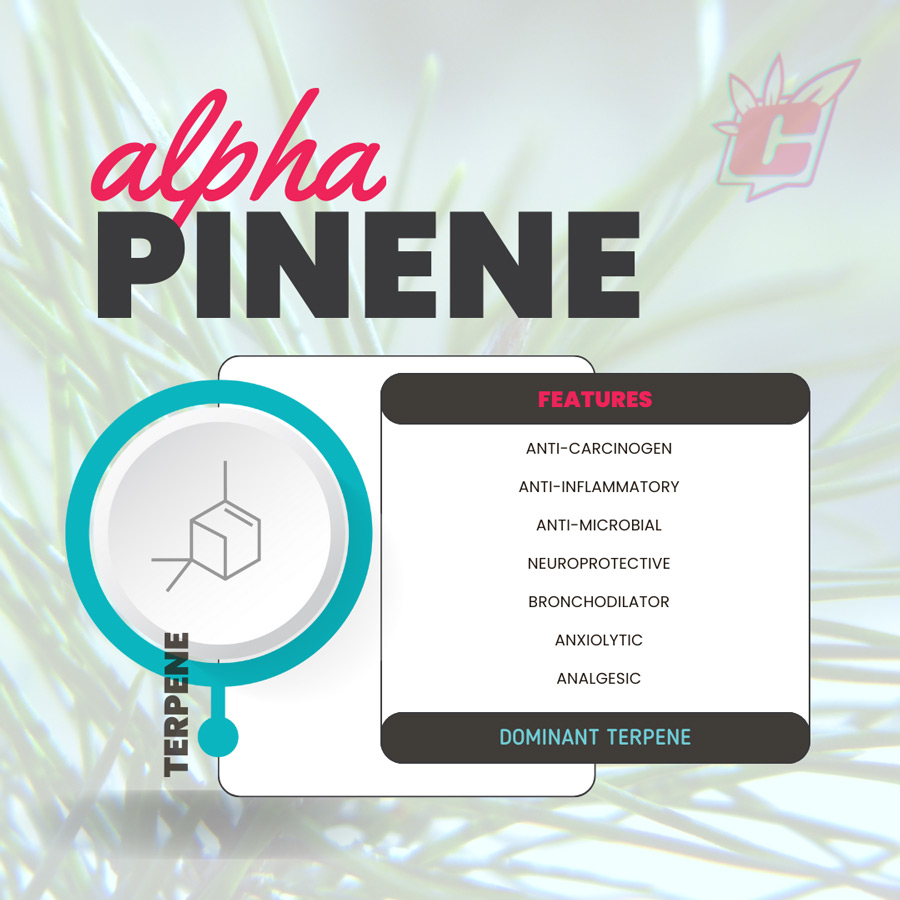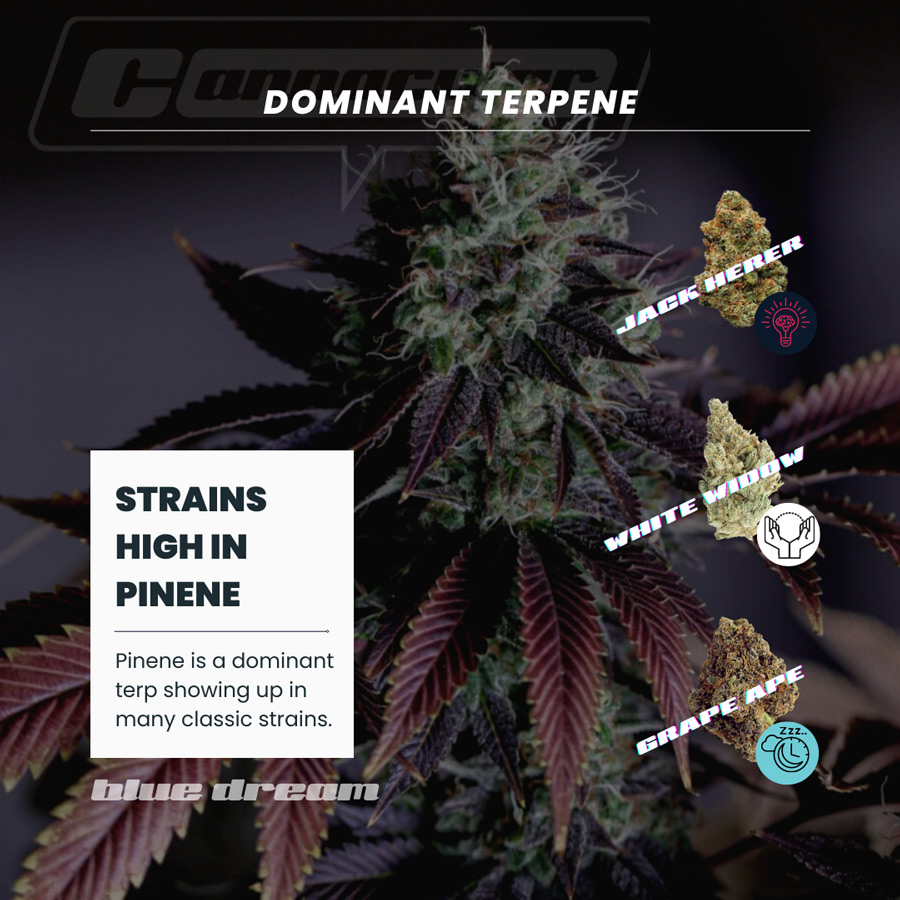What are cannabis terpenes? If you’re a fan of cannabis, you’ve likely heard of terpenes. A terpene is an aromatic compound found in many plants, including cannabis. There are dozens of different terpenes in cannabis, each with its own unique set of benefits. In this blog post, we’ll be focusing on the benefits of alpha-pinene, one of the most dominant terpenes in cannabis.
What is the terpene Alpha-Pinene?
This dominant terpene exists in high concentrations in many strains of cannabis. Alpha-Pinene shows up in rosemary, basil, and pine needles. This terpene has a potent aroma. The aroma resembles a woody and earthy scent with strong hints of pine and citrus.

The Benefits of Alpha-Pinene
Research suggests that alpha-pinene may offer a wide range of potential benefits. In recent studies, alpha-pinene has shown beneficial anti-inflammatory and analgesic effects. This means that it may be effective in treating conditions like arthritis and chronic pain. That isn’t the only benefit, pinene also appeared to help improve cognitive function and memory recall. This makes it a promising treatment for Alzheimer’s and other forms of dementia.
Pinene possesses broncho dilatory properties, which means that it can open up the airways and improve breathing. This means it can aid in the treatment of asthma and other respiratory conditions. The benefits don’t stop there. Alpha-pinene shows promise as a antibacterial, antifungal, and antioxidant. This makes it an effective treatment for various infections. It even helps to reduce inflammation throughout the body.
Below we break these benefits down and show you the studies being conducted by the frontiersmen of cannabis science.
Cannabis Strains That Contain High Concentrations of the terpene Alpha-Pinene
If you’re looking for a cannabis strain that’s high in pinene, you should consider trying one of these strains: Blue Dream, Jack Herer, Super Silver Haze, OG Kush, Grape Ape, White Widow and many more.

As you can see, the terpene alpha-pinene offers a wide range of potential benefits. If you’re looking for a strain of cannabis that’s high in this particular terpene, be sure to try one of the strains listed above. And if you have any questions about alpha-pinene or other aspects of cannabis, don’t hesitate to visit your local dispensary or contact a qualified cannabis industry professional for more information. Or reach out to our team directly!
Consumer Anecdotal Reports on alpha-Pinene in Cannabis
This terpene has helped people who deal with anxiety, insomnia, depression, arthritis, chronic inflammation, asthma, chronic pain, diabetes, and digestive issues. If you’re looking for a terpene that can help with a wide variety of issues, alpha-pinene is a great choice.
Cannabis Terpenes and the Entourage Effect
Mixology for Alpha-Pinene
A certain mixology is needed to unlock the true power of terpenes. The compounds that unlock the benefits of pinene and terpenes are cannabinoids and flavonoids. Through this chemical mixology terpenes, cannabinoids, and flavonoids produce the unique feeling and benefit of a cannabis strain.
Additional Research Regarding the Benefits of alpha-Pinene and Cannabis Terpenes
Beyond the consumer anecdotal evidence, multiple scientific studies have identified pinene as a compound that functions as an anxiolytic, analgesic, anti-carcinogen, anti-inflammatory, anti-microbial, anti-bacterial, neuroprotective, and bronchodilator.
Below are some scientifically researched claims that show the benefits of alpha-pinene
Anxiolytic compound.
Pinene may have anxiolytic effects. In one study, alpha-pinene was found to reduce anxiety-like behaviors in a dose-dependent manner. Pinene showed a decrease in the time it takes for rats to fall asleep. These findings suggest that pinene could be a valuable terpene for treating anxiety disorders.
Analgesic compound.
Pinene may have analgesic effects. In one study, alpha-pinene was found to decrease the amount of time it took for rats to stop licking a wound. In another study, pinene showed efficacy as a painkiller, comparable to morphine. These findings suggest that alpha-pinene could be a valuable terpene for treating pain disorders.
Anti-carcinogen compound.
In one study, pinene helped to suppress the growth of cancer cells. Data showed that it can protect normal cells from the harmful effects of chemotherapy. These findings suggest that alpha-pinene could be a valuable terpene for preventing or treating cancer.
Anti-inflammatory compound.
In one study, alpha-pinene helped to reduce inflammation in a dose-dependent manner. Data showed the terpene helps decrease the amount of time it took for rats to recover from an inflammatory injury. These findings suggest that alpha-pinene could be a valuable terpene for treating inflammation disorders.
A 2014 study published in The Journal of Natural Products concluded that pinene has anti-inflammatory effects in human chondrocytes (cells responsible for the production of cartilage).
Anti-microbial and anti-bacterial compound.
Pinene may have anti-microbial effects. In one study, it was found to kill a wide variety of bacteria, including E. coli and MRSA. The terpene is also effective at combating several types of fungus. These findings suggest that pinene could be a valuable terpene for preventing or treating infections.
This study explains some mechanisms behind the alpha-pinenes antimicrobial properties.
A 2011 study found alpha- and beta-pinene to be effective in fighting the anti-infectious bronchitis virus, or IBV.
Neuroprotective compound.
Pinene has been shown to have neuroprotective effects. In one study, it was found to protect brain cells from damage caused by stroke. By reducing the amount of inflammation and free radical damage in the brain alpha-pinene acts as a protective compound. These findings suggest that alpha-pinene could be a valuable terpene for preventing or treating neurological disorders.
A survey of studies published in the journal Frontiers in Psychiatry in 2021 reviewed the potential uses of pinene and linalool as terpene-based medicines for brain health. Using animal models, scientists concluded that alpha-pinene could have benefits against not just Alzheimer’s. According to a 2017 study published in Evidence-Based Complementary and Alternative Medicine, scientists found it helps with; general dementia, amnesia, cognitive dysfunction, and general memory loss.
Bronchodilator compound.
Pinene has been shown to have bronchodilator effects. In one study, it was found to open up the airways and improve breathing in rats with asthma. These findings suggest that pinene could be a valuable terpene for treating asthma.
Pinene works synergistically with THC, and acts as a bronchodilator. Olfactory stimulation studies showed, pinene boasts a robust catalogue of therapeutic uses, including anti-inflammatory and tumor-reducing properties, along with antimicrobial and broncho dilating benefits. Show Source Texts
Given the studies it seems pinene can aid in symptom relief related to bronchitis, asthma, and even COPD.
Post will be continuously updated as new data becomes available on all cannabis terpenes
Cited Sources and Helpful Resources
- https://strainprint.ca/understanding-terpenes-pinene/ 0
- https://www.ncbi.nlm.nih.gov/pmc/articles/PMC8426550/ 1
- https://www.siranaturals.org/blog/cannabis-terpenes-alpha-pinene 2
- https://abstraxtech.com/blogs/learn/alpha-pinene-health-benefits 3
- https://weedmaps.com/learn/the-plant/pinene 4
- https://www.trulieve.com/discover/blog/everything-you-need-to-know-about-pinene 5
- https://straingenie.com/cannabis-terpenes/alpha-pinene-beta-pinene/ 6
- https://www.wweek.com/potlander/2022/01/19/alpha-pinene-one-of-the-most-commonly-occurring-terpenes-on-earth-smells-like-a-christmas-tree-and-boasts-therapeutic-uses/ 7
- https://wayofleaf.com/education/what-is-pinene 8
- https://acslabcannabis.com/blog/terpenes/terpene-tuesdays-everything-you-need-to-know-about-pinene-flavor-fragrance-and-health-benefits/ 9
- https://dutch-passion.com/en/blog/what-is-alpha-pinene-uses-and-effects-of-this-terpene-found-in-cannabis-n968 10
- https://www.claybourneco.com/blog/the-piney-terpene-alpha-pinene 11
- https://finestlabs.com/pinene-terpene/ 12
- US NATIONAL LIBRARY OF MEDICINE – ( ncbi.nlm.nih.gov )
- US NATIONAL LIBRARY OF MEDICINE – ( ncbi.nlm.nih.gov )
- US NATIONAL LIBRARY OF MEDICINE – ( ncbi.nlm.nih.gov )
#antimicrobialeffects #therapeuticbenefits #therapeuticuses #antimicrobialproperties #anxietybenefits #enhancedanti #inflammatoryproperties #neuroprotectiveproperties #cancerproperties #cannabisspain #alternativemedicine #potentialbenefits #healthbenefits #inflammatoryeffects #antioxidantbalance

